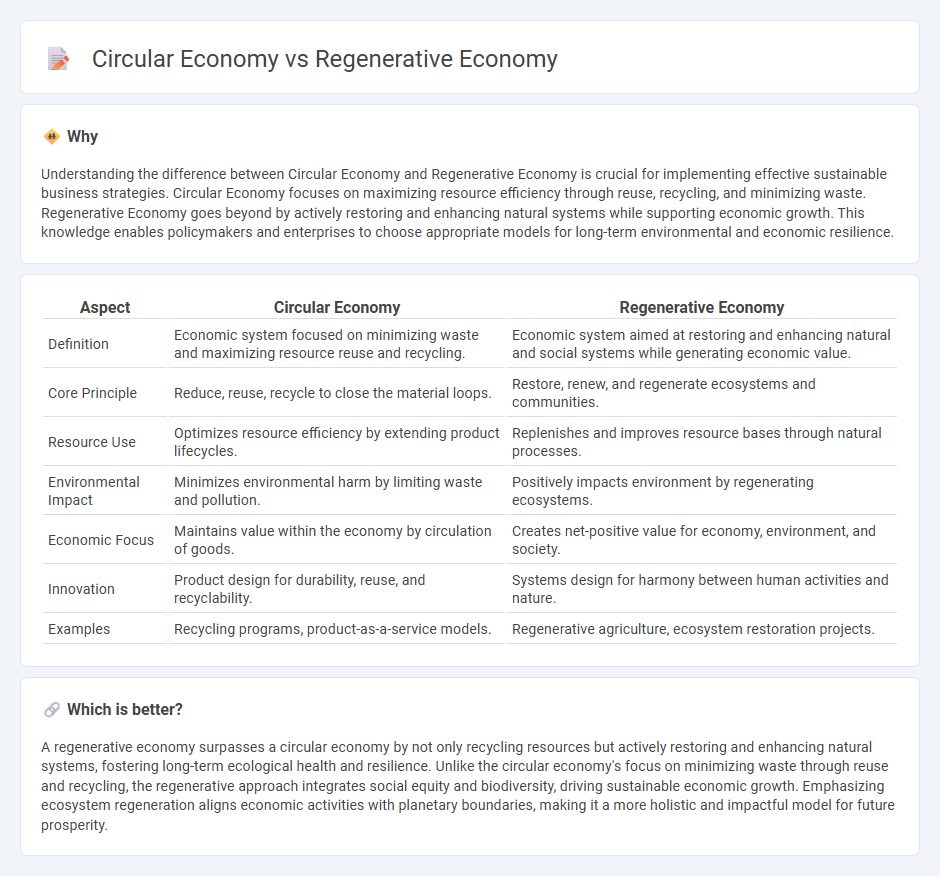
The circular economy emphasizes minimizing waste and maximizing resource efficiency through reuse, recycling, and sustainable design to create a closed-loop system. In contrast, the regenerative economy focuses on restoring and enhancing natural ecosystems while fostering social equity and long-term resilience. Explore these innovative economic models to understand their impact on sustainability and future growth.
Why it is important
Understanding the difference between Circular Economy and Regenerative Economy is crucial for implementing effective sustainable business strategies. Circular Economy focuses on maximizing resource efficiency through reuse, recycling, and minimizing waste. Regenerative Economy goes beyond by actively restoring and enhancing natural systems while supporting economic growth. This knowledge enables policymakers and enterprises to choose appropriate models for long-term environmental and economic resilience.
Comparison Table
| Aspect | Circular Economy | Regenerative Economy |
|---|---|---|
| Definition | Economic system focused on minimizing waste and maximizing resource reuse and recycling. | Economic system aimed at restoring and enhancing natural and social systems while generating economic value. |
| Core Principle | Reduce, reuse, recycle to close the material loops. | Restore, renew, and regenerate ecosystems and communities. |
| Resource Use | Optimizes resource efficiency by extending product lifecycles. | Replenishes and improves resource bases through natural processes. |
| Environmental Impact | Minimizes environmental harm by limiting waste and pollution. | Positively impacts environment by regenerating ecosystems. |
| Economic Focus | Maintains value within the economy by circulation of goods. | Creates net-positive value for economy, environment, and society. |
| Innovation | Product design for durability, reuse, and recyclability. | Systems design for harmony between human activities and nature. |
| Examples | Recycling programs, product-as-a-service models. | Regenerative agriculture, ecosystem restoration projects. |
Which is better?
A regenerative economy surpasses a circular economy by not only recycling resources but actively restoring and enhancing natural systems, fostering long-term ecological health and resilience. Unlike the circular economy's focus on minimizing waste through reuse and recycling, the regenerative approach integrates social equity and biodiversity, driving sustainable economic growth. Emphasizing ecosystem regeneration aligns economic activities with planetary boundaries, making it a more holistic and impactful model for future prosperity.
Connection
Circular economy and regenerative economy are interconnected through their shared focus on sustainable resource management and minimizing environmental impact. The circular economy emphasizes the continuous reuse, recycling, and refurbishment of materials to reduce waste, while the regenerative economy aims to restore and enhance natural ecosystems by promoting practices that rebuild soil, biodiversity, and carbon sequestration. Both models drive economic growth by aligning production and consumption with ecological health, fostering resilience, and promoting long-term sustainability.
Key Terms
Restoration (Regenerative economy)
The regenerative economy emphasizes restoring ecosystems and enhancing biodiversity through sustainable practices that replenish natural resources rather than merely minimizing waste, unlike the circular economy which prioritizes material reuse and recycling to create closed-loop systems. Restoration in a regenerative economy involves proactive interventions such as reforestation, soil regeneration, and carbon sequestration to rebuild ecosystem health and resilience. Explore how regenerative strategies drive long-term ecological balance and economic growth by learning more about their impact on global sustainability.
Closed-loop system (Circular economy)
A closed-loop system central to the circular economy emphasizes resource efficiency by designing products for reuse, remanufacturing, and recycling, minimizing waste and extending material life cycles. In contrast, the regenerative economy focuses on restoring natural systems and enhancing environmental health through sustainable practices that replenish ecosystems. Explore the distinct impacts and benefits of circular versus regenerative economic models to understand sustainable development strategies.
Systems thinking
Regenerative economy emphasizes restoring natural ecosystems by integrating social and environmental health into economic practices, while circular economy prioritizes minimizing waste through resource recirculation and product lifecycle extension. Both models apply systems thinking to balance economic growth with ecological sustainability and resource efficiency. Explore deeper insights on how systems thinking transforms these economic frameworks for sustainable development.
Source and External Links
Regenerative economic theory - Regenerative economics is an economic system that aims to regenerate capital assets by promoting circulation of resources, renewable resource use, diversified business sizes, and collective learning, guided by ten key principles to enhance systemic resilience and sustainability.
A People's Orientation to a Regenerative Economy - A regenerative economy prioritizes ecological restoration, community governance, equitable partnerships, and values the health of the planet and dignity of work by rejecting extractive systems and supporting collective decision-making.
Regenerative economies - Regenerative economies function like resilient ecosystems, focusing on circularity, resource regeneration, waste absorption, and promoting economies that balance human needs with ecological health through systemic circular flows and mutualistic relationships.
 dowidth.com
dowidth.com